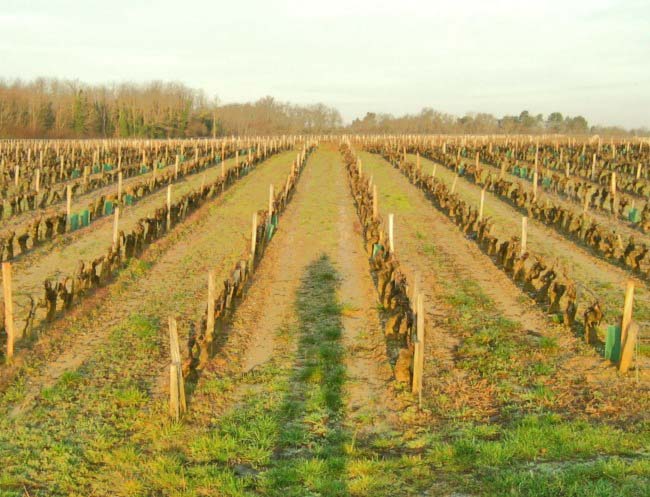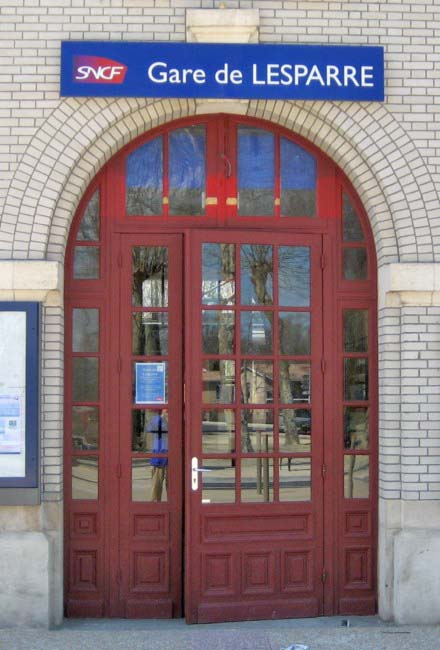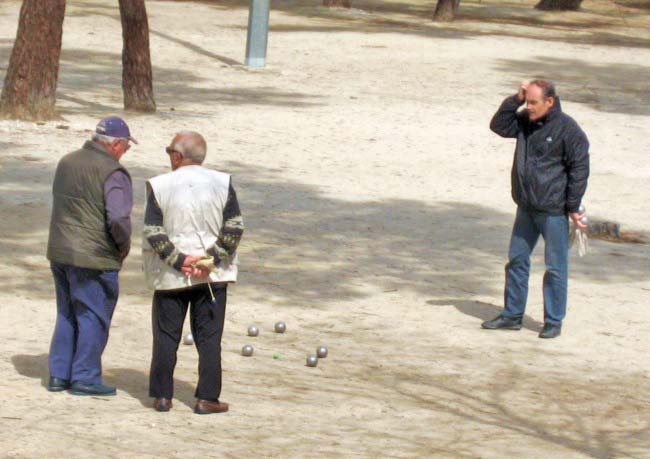|
Day B26 - Second-last
day
|
|
March 29,
2010
Saint Laurent Médoc to Lesparre Médoc
12 miles
|
 |
 |
| I
took Sunday, March 28 as a rest day, the first since being trapped in
snow back in Bram. My Day B25 hike on Saturday was a bruiser in wind and rain with a sloping grass verge and lots of traffic. To continue on Sunday, it looked as if I would have had to contend with similar weather, and faced a hotelier-deadline to arrive by 1 pm "or we're closed De plus, bring your own sandwiches". The message was clear. I hunkered down happily at the Hôtel le Saint Laurent. |
|
Wednesday, March 28, 2010 morning (rest day) The tyranny of
logistics. On my rest day, I spent hours getting the next two days of
hiking set up.
My plan is to hike 12 miles to Lesparre Médoc, arriving early enough to hop a train or bus to my final destination of Soulac-sur-mer. I need a hotel in Soulac for the night, or actually several nights as I take some time off. After the first night in Soulac, leaving my pack in the hotel, I'll hop a train or bus back to Lesparre, and hike the 19 miles to Soulac. The hiking part should be straightforward. And what a good idea to set it up like that. That's the idea of Steve B back in Champaign. I'll be able to hike the last long day without a pack. But the planning has been a nightmare. First off, the schedule shows few trains on any day, with a large gap after 2.15 pm requiring me to hike purposefully to get to Lesparre by 2.15. When you use the train site (SNCF), however, it doesn't show any train scheduled for March 29, referring to an interruption in service down south to install new equipment. But there's a bus, right? Well, maybe not. On occasions, the train is a bus, and vice versa. Moreover, the bus is "on request", which actually means you have to order it up the day before. "The day before" Monday here is Friday, but it's now Sunday. So having been burned by zero-passenger-operations, the bus company may not operate the bus at all. I have to hope that someone else requested it. Hobson has that recurring vision of standing alone in the cold at a station or bus stop, wishing he was somewhere else, anywhere else. And there's no one to turn to. So having booked that hotel in Soulac, will I get there? Yes - probably. But, then, is the hotel actually booked? That all depends what you think of an arrangement where you book online, at a site you've used before that has your credit card and at which, they say, they're going to take a deposit for three nights. You press the button that says you agree with their cancellation provisions, and then - wham - it says (for the first time for this chain of hotels) "we've received your request and will confirm soon". So now you don't know whether you're booked or not. But that's OK, you call the hotel to solve the problem - and it's closed. So now Hobson has that other recurring vision of standing alone in the cold at a hotel that is closed, wishing that he was somewhere else, anywhere else. And there's no one to turn to. In this case, the vision includes the delectable scenario that he finds somewhere else to stay (Hotel B), at which place he logs on to his email. At that exact moment, a new email message arrives. It's in French, of course, but he slowly figures it out. "We are glad to inform you that you are now confirmed at Hotel A and your credit card has been charged as you agreed in our terms and conditions. It is now 5.55 pm and you must arrive by 5.54 pm, or cancel by 5.53 pm." Well, it probably won't happen like that. I will call the hotel on the hoof and hope they can tell me I'm booked - or not - assuming they're open. Then I hope the transportation will get me there. So why book at all? I like the security of a place all lined up - and I hate trudging around looking for somewhere. Why book online? It avoids a language problem - and a situation where the hotelier says on your arrival "we have no record of your booking" (it happened earlier on this hike). Small places here use a scratch pad to manage their reservations. A scratch pad is a device for losing reservations. Wednesday, March 28, 2010 afternoon (same rest day)
I
am in the Gironde. That's the region as well as the estuary itself.
History oozes out of its pores, much of it maritime history. From
nearby Pauillac, the Marquis de Lafayette set sail for America in 1777
on the Victoire,
rallying
the Americans in their fight against the British. He is the same La
Fayette mentioned on the Thomas Jefferson plaque pictured on Day B10.
As I will describe further tomorrow, the Cordouan lighthouse at the mouth of the estuary is famous for its grandeur, its appointments, and its light. But there's a slice of local maritime history that intrigues me most because of my childhood reading of naval adventures. I am indebted to the unknown author at this site for the story which appears in a blog called the "Age of Sail". In 1806, Lord Cochrane was in charge of HMS Pallas, a 32-gun frigate, part of a British squadron blockading the Gironde and Bordeaux and stationed at the Cordouan lighthouse. There Cochrane got word that two French corvettes were anchored upriver not far from where I write this today. Cochrane decided to capture them. To do this, Cochrane placed most of the Pallas's crew in two longboats, which he'd even had built, leaving the Pallas itself barely manned. Under cover of a convenient fog, the Pallas's party rowed upriver with the incoming tide and captured the French corvette, Tapaguese, before retreating with the ebbing tide. This good fortune with the tides also saved him from attacking not the one but two other corvettes, which had been alerted by the attack on the Tapaguese and whom, combined, might have reversed the French misfortune. As
the British raiding party was returning, the Pallas
was approached by three additional French corvettes with enough cannon
to outgun the British ship, at least in number. Moreover the British
ship was undermanned. Sensing a disaster, Cochrane employed a strategy
to hide his lack of manpower from the approaching French by reefing his
sails with yarn instead of rope. On his signal, the yarn was cut, and
the sails deployed simultaneously as if the Pallas was fully
manned.
The French corvettes took off - separately, on the misguided principle that those who do not stand together will survive separately. One grounded itself to allow the crew to escape, and the Pallas holed her with its cannon to make the grounding permanent. The same happened to a second corvette. The third corvette escaped out to sea. But the Pallas, now seeking the planned rendezvous with the captured Tapaguese, chanced upon this corvette also, and it met a similar fate to the first two. So Cochrane had destroyed three enemy corvettes, and captured another, taking 80 French prisoners without suffering more than a few wounded himself. For
that night's work he became a hero in the public's eyes - but not
the Admiralty's. They paid no prize money for the Tapaguese, or head
money for the prisoners, or gun money for the three destroyed corvettes.
It seems that Cochrane failed to give his boss all the credit for his success. Hobson nodded vigorously. Thursday,
March 29, 2010 (the hike)
I
was on the road by 8 am and reached Lesparre by 12.15 pm in perfect
hiking weather - calm, sunny, and almost hot. It wasn't quite the dog
days of summer - but it wasthe dog days of Lesparre. I am used to being
barked at, sometimes by truly aggressive dogs. In other places, the
dogs may run along a fence or wall as I pass by - on the other side of
the fence or wall. But not in Lesparre. In Lesparre, it seems that the
walls and the fences are either missing or have gaps. So those snarling
dogs came after me on at least two occasions.
"No wonder we got to the station in good time," said Hobson. Well, I did hasten past the dogs, but it wasn't speed that saved me. It was the hiking stick. One particularly nasty animal had bared his teeth and lunged at me as I approached, but backed off when I raised the stick. Seconds later, as I passed by and showed my back to him, I had a sense that I needed to turn around. And there he was, almost upon me, anxious for a goodly bite of hiker leg nicely salted from perspiration. Showing him the stick made him cower and keep his distance. For a moment, I wasn't sure that he would. Lesparre did not endear itself to me. But my early arrival let me catch the 2.15 pm train to Soulac. At the station, I called the hotel that I'd "booked" online, but they were full. They referred me to another hotel - but, after arrival at Soulac, I found it was two miles out of town - which is not what I need for an early train in the morning. I ended up walking around the town, and finding an expensive place without wifi. So
now I am in
Soulac, and I have already seen the Cordouan lighthouse, gleaming on
the horizon in the afternoon sun. I almost averted my gaze, because I
got here by rail - so I am not officially here but in Lesparre.
Tomorrow, I need to return to Lesparre and walk to Soulac to make it
"mine".
"Kind of like a dog marking its trail with pee," said Hobson. In a way, he is right. This hike is much like blazing my own trail. If the origin and destination were what it were all about, I could have driven the whole route in eight hours. "You're right," I said. "But I skipped a tree near Toulouse." |
 |
| Start Intro Day B25 Day B27 |
| © 2010 - 2013 Daryl May |